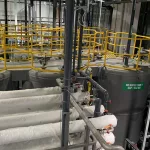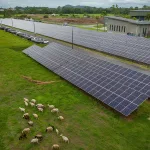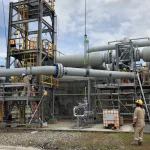ASB Biodiesel is well established in the industry without requiring modification Company when it comes to the successful and sustainable creation of biodiesel; working towards air quality objectives and a cleaner future.
FUELLING HONG KONG
With its operating base located in Hong Kong, ASB Biodiesel’s factory has the capacity to produce 100,000 tonnes of low-carbon transport fuel a year, a huge amount that is enough to fuel every diesel engine running on the City’s roads.
The Company has worked tirelessly with the aim of offsetting some of the greenhouse gas emissions produced by Hong’s transport sector; and presently the Company has managed to offset 257,000 tonnes which equates to 3.6 percent of the total amount.
ASB Biodiesel has differentiated itself from other biodiesel production plants in the industry, with its facilities able to process multiple feedstocks, some of which include cooking oil and grease-trap oil.
“Our fuel meets the EN 14214 standard of the European Committee for Standardisation,” explains the Company on its website. “We are incredibly proud of ASB Biodiesel and the product we produce, making a clean, low-carbon transport fuel that can be used as a substitute for fossil diesel, or alternatively blended with fossil diesel without requiring modification of diesel engines.”
Around 90 percent of the global biodiesel produced is based on edible oils gained from crops such as rapeseed, soy and palm, however, at times this can be slightly controversial as it can compete with food production and subsequently may then contribute to rising food prices.
“This is where we are excelling in the industry and setting ourselves apart as ASB Biodiesel’s produce is produced from waste,” affirms the Company. “We then do not cause any land use changes and produce significantly lower greenhouse gas emissions from the avoidance of upstream carbon emissions that go hand-in-hand with seed oil extraction and crop production.”
BETTER AIR QUALITY
The actual biodiesel product produced by the Company is made from the triglycerides taken from vegetable oils and animal fats – achieved through a chemical process known as transesterification – and these feedstocks are then combined to create biodiesel along with by-products such as bio-heating oil, glycerine and fertiliser.
“The by-product bio-heating oil is a particularly heavy fraction coming from the distillation of biodiesel,” the Company adds. “We are able to successfully use this product in our own plant as a form of heating.”
Of course biodiesel has the predominant advantage of significantly reducing greenhouse gas emissions, however, there are many reasons why its production has advantages over petroleum-based diesel; although the reduction is dependent on the type of feedstock used, with ASB’s main feedstock being cooking oil and other waste oils.
“The Biodiesel is proving to be a big player in contributing to better air quality, alongside reducing tailpipe emissions that contribute to this pollution,” the Company describes. “It has been estimated by the US Environmental Protection Agency that blending 20 percent biodiesel with 80 percent petroleum-based diesel reduces emissions by an average of 15 percent which is excellent news.”
REDUCING EMISSIONS
Due to a multitude of reasons, particularly focusing around the roadside pollution emerging from motor vehicles and high regional emissions, Hong Kong has stopped short of reaching its current Air Quality Objectives (AQOs).
“Our AQOs were set out back in 1987 as part of Hong Kong’s Air Pollution Control Ordinance, and while our Government has since set a new set of Air Quality Objectives,” continues the Company. “Meeting them involves huge measures being put in place and we believe in the coming years we will see Biodiesel offering a helping hand to Hong Kong in meeting air quality aspirations.”
As previously mentioned, ASB Biodiesel has been successful in meeting the EU’s EN 14214 standard, due to its successful biodiesel blends. At present Hong Kong as a whole maintains the standards for biodiesel that can be used in vehicles – set out in the Air Pollution Control Regulation – and it is due largely to the work of companies such as ASB Biodiesel and the work happening there.
The Company adds: “We are very aware that the potential for emission reduction in Hong Kong is still unrealised, with the use of biodiesel in Hong Kong being voluntary unlike many European and Asian countries, meaning we are in for a particularly exciting few years in the industry.”
MANDATORY BLENDING
With the aforementioned mandatory blending regulations seen in most European countries and Asian countries including Indonesia, Malaysia, South Korea, Taiwan, Thailand and Vietnam, the development of the domestic biodiesel markets is growing at a rapid rate.
This has subsequently reduced the dependence on fossil fuels and cuts down the emissions of greenhouse gases and roadside pollutants, and the mandatory blending will often comprise a blend of between five and 20 percent.
The Company describes: “It has predominantly been recommended to us and similar companies, that we follow Hong Kong’s Climate Change Strategy and Action Agenda set out in 2010, which suggests the adoption of a 10 percent blend.”
Of course Hong Kong has the ability to mandate blending at any time, however, as the biodiesel companies operating there are already achieving great success with a 10 percent blend. It is also important to take into account ASB’s capacity to fuel every diesel engine operating in Hong Kong currently.
“We are lucky to be operating in a place in which the warranties of most major automobile and engine manufacturers are already supporting the use of a five percent blend and above,” concludes the Company. “Presently we have a lot of scope and support to work with and looking forward it seems this support will only expand with our project development.”

































